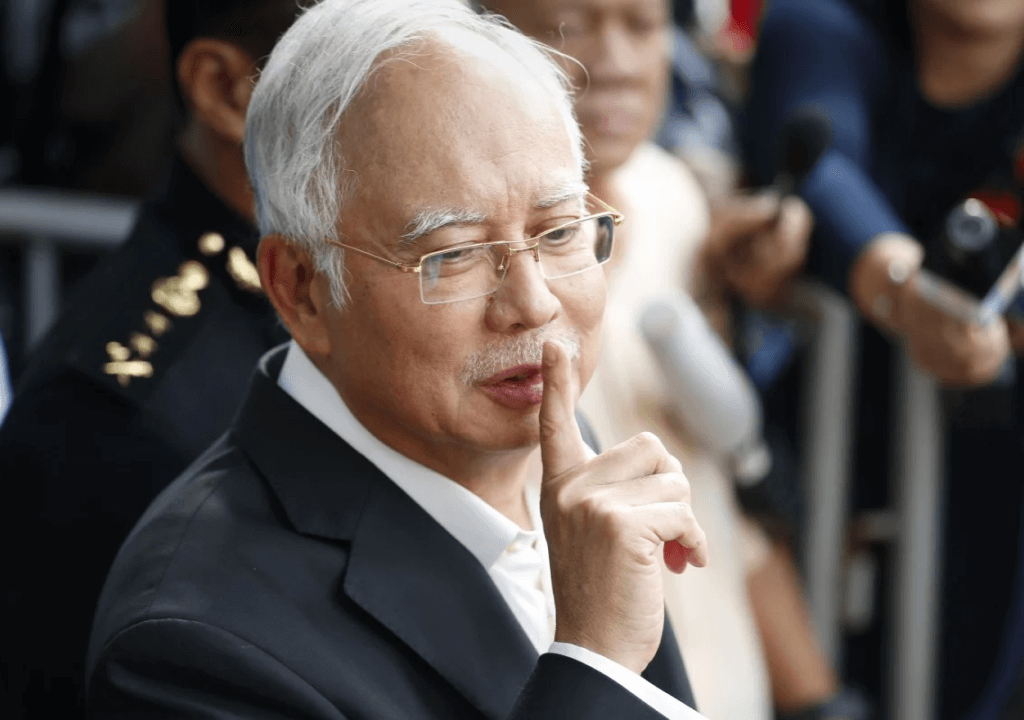The Federal Territories Pardons Board has formally declared a reduction in the prison sentence for the former Prime Minister, Najib Razak. Following his conviction for embezzling RM42 million from a defunct 1MDB unit, Najib will now serve a shortened sentence. The decision of the Pardons Board is particularly noteworthy, given the pronounced corruption in the case.
Najib, a figure of prominence, a former prime minister, and the son of the late Prime Minister Abdul Razak Hussein, held significant roles. He served as the president of the United Malays National Organization (UMNO) from November 2008 to May 2018. Additionally, he assumed leadership as the head of the Barisan Nasional (BN) coalition, guiding Malaysia for almost six decades with a parliamentary majority until the defeat in the 2018 general election.
Najib faces multiple criminal charges, having been on trial since 2020. Simultaneously dealing with three other ongoing criminal cases, he is currently facing trial for 25 counts related to abuse of power and money laundering. These charges involve RM2.28 billion from 1MDB funds deposited into his AmBank accounts between 2011 and 2014. Additionally, he is accused of three charges of money laundering, amounting to RM27 million, through three AmPrivate banking accounts. Collaborating with Irwan Siregar Abdullah, Najib faces six charges linked to the misappropriation of RM6.6 billion in public funds, associated with payments to IPIC, an Abu Dhabi state-owned entity. Commencing his prison sentence in August 2022, the latest resolution indicates that Najib is expected to be released from custody by 2028.
DAP, the predominant party in the Dewan Rakyat, has urged the public to remain composed in the wake of the Pardons Board’s decision to reduce the sentence of former Prime Minister Datuk Seri Najib Razak. Anthony Loke, the secretary-general of DAP, emphasized that the Pardons Board’s ruling is definitive and not subject to challenge in any court. He clarified that while the decision doesn’t absolve Najib of his conviction, it is a final judgment.
Acknowledging the discontent among some Pakatan Harapan supporters, Loke affirmed that the Cabinet played no role in the decision, and the Pardons Board’s autonomy should be respected. He added that this development would not impact DAP’s relationship with Umno-Barisan Nasional in the coalition government, although he expressed uncertainty about its effects on the coalition’s prospects in the upcoming general election.
Loke clarified that existing laws afford every individual, including Najib, the right to seek a pardon for their crimes, specifying that in this instance, Najib was not pardoned. Despite the sentence reduction, Loke emphasized that Najib remains guilty of the charges, and the rationale behind the decision rests solely with the Pardons Board.
Former Umno Youth chief Khairy Jamaluddin acknowledged that the board is not obligated to disclose its decision-making process but asserted that doing so would be in the public interest. Given the high-profile nature of the case involving a former prime minister, Khairy emphasized the importance of transparency and suggested that a representative of the board should explain the grounds for the sentence reduction to address the serious concerns of the Malaysian public.
In Malaysia, each state possesses its own pardons board, appointed by the respective sultan or governor, with the sole exception of the federal territories. In the federal territories, the members are appointed by the King. The Federal Territories Pardons Board, overseen by the King, comprises five members, including the attorney-general, the federal territories minister (currently Dr. Zaliha Mustafa), and up to three others appointed by the King. Pardons Board’s ruling is definitive and not subject to challenge in any court. It is also deemed immoral to disagree with the board’s decision.
The pardons board is called upon to elucidate the reasons behind the reduction in Najib’s prison sentence, as the decision has left everyone perplexed. While the decision may be perplexing, it is essential to acknowledge the context within the constitutional monarchy framework. Malaysia, as a nation, has consistently adopted a robust stance against corruption. Consequently, this decision is expected to impact the country’s reputation, raising concerns about its commitment to anti-corruption efforts.








